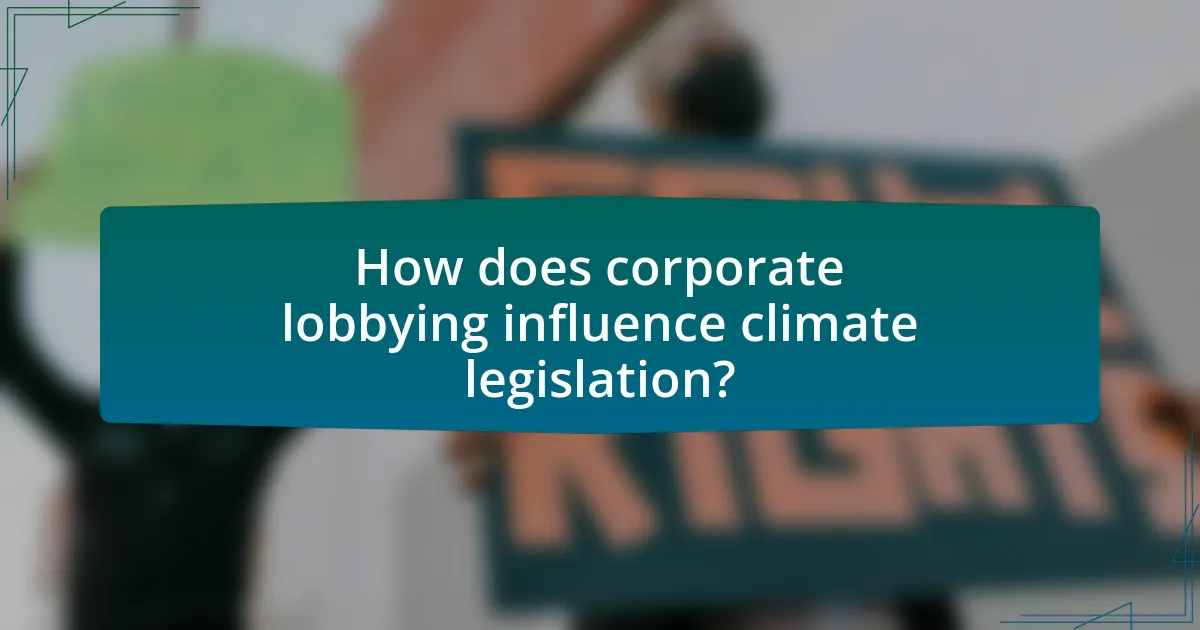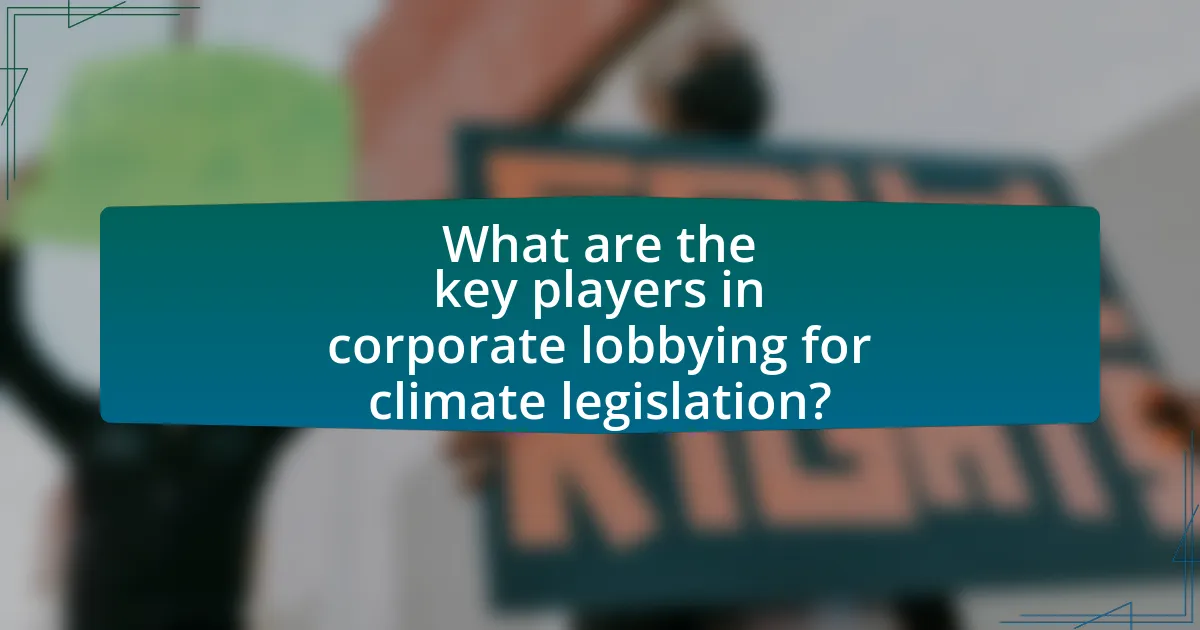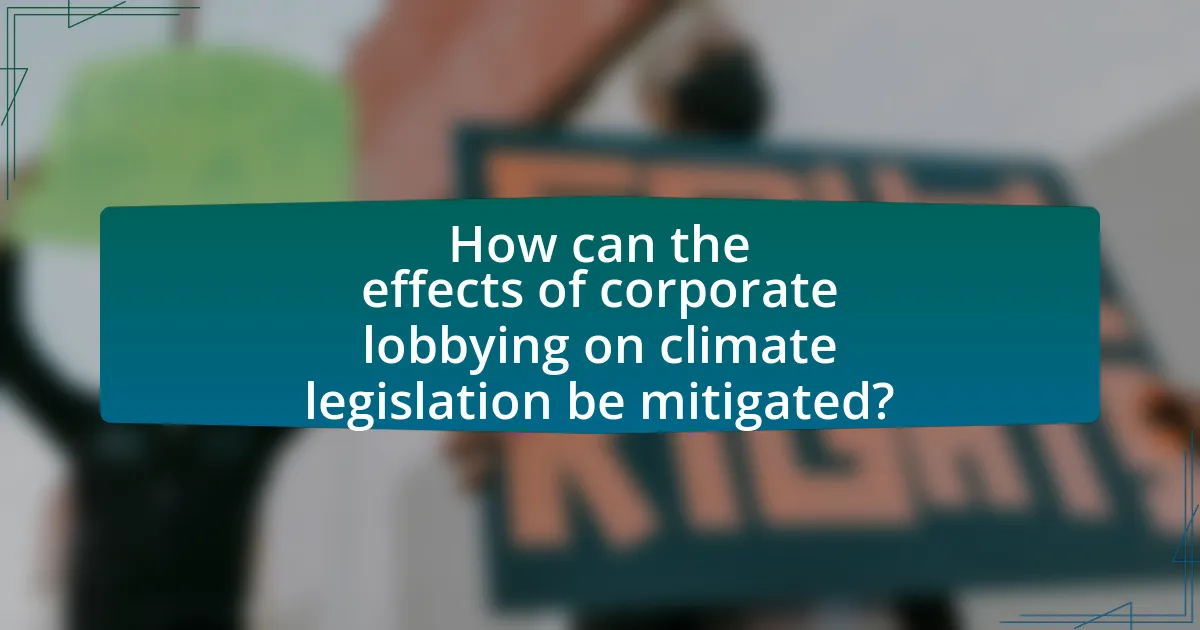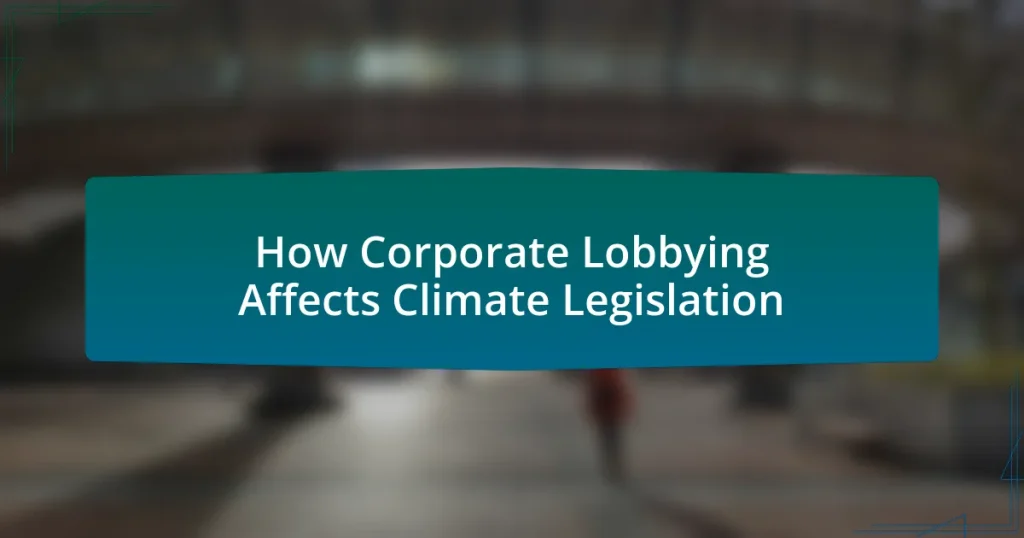Corporate lobbying plays a critical role in shaping climate legislation, often prioritizing corporate interests over environmental protections. The article examines how corporations, particularly in the fossil fuel industry, utilize tactics such as direct lobbying, political contributions, and public relations campaigns to influence lawmakers and public perception. It highlights the significant financial resources directed towards lobbying efforts, which can lead to weakened climate regulations and delayed action on climate change. Additionally, the article discusses the impact of corporate lobbying on legislative outcomes, the relationships between lobbyists and lawmakers, and the potential strategies for mitigating these influences to promote fair and effective climate policies.

How does corporate lobbying influence climate legislation?
Corporate lobbying significantly influences climate legislation by shaping policy outcomes to favor corporate interests over environmental protections. Corporations often invest substantial resources in lobbying efforts to sway lawmakers, resulting in legislation that may prioritize economic growth or industry profitability at the expense of climate action. For instance, a report by the Center for Responsive Politics indicated that the fossil fuel industry spent over $100 million on lobbying in 2020 alone, which correlates with legislative efforts that weaken environmental regulations. This financial influence can lead to the dilution of climate initiatives, as seen in the rollback of the Clean Power Plan under the Trump administration, where lobbying efforts from energy companies played a crucial role in policy changes.
What are the primary tactics used in corporate lobbying related to climate issues?
The primary tactics used in corporate lobbying related to climate issues include direct lobbying of lawmakers, funding political campaigns, and engaging in public relations campaigns to shape public opinion. Direct lobbying involves corporations hiring lobbyists to influence legislation and regulatory decisions that impact climate policies. For instance, the fossil fuel industry has historically spent billions on lobbying efforts to oppose climate regulations. Funding political campaigns allows corporations to support candidates who align with their interests, thereby gaining access to decision-makers. Additionally, public relations campaigns are utilized to promote narratives that downplay climate change or advocate for industry-friendly policies, as seen in various campaigns funded by energy companies to cast doubt on climate science. These tactics collectively aim to protect corporate interests while influencing climate legislation.
How do corporations prioritize their lobbying efforts on climate legislation?
Corporations prioritize their lobbying efforts on climate legislation by aligning their strategies with financial interests, regulatory impacts, and public perception. They assess potential legislation based on how it will affect their profitability, compliance costs, and market competitiveness. For instance, companies in fossil fuel industries often lobby against stringent climate regulations to protect their existing business models, while renewable energy firms advocate for policies that promote clean energy investments. Research from the Center for Responsive Politics indicates that in 2020, the fossil fuel sector spent over $100 million on lobbying efforts, demonstrating a clear prioritization of influence over climate policy that could threaten their operations.
What role do lobbyists play in shaping climate policy?
Lobbyists play a significant role in shaping climate policy by influencing lawmakers and government officials to adopt specific regulations and legislation that align with their interests. They represent various industries, including fossil fuels, renewable energy, and agriculture, and use strategies such as providing research, funding political campaigns, and mobilizing public opinion to advocate for or against climate-related policies. For instance, a report by the Center for Responsive Politics indicated that in 2020, the fossil fuel industry spent over $100 million on lobbying efforts, which directly impacted legislative outcomes related to climate change. This financial influence often leads to the prioritization of corporate interests over environmental protections, thereby shaping the direction and effectiveness of climate policy.
Why is corporate lobbying significant in the context of climate change?
Corporate lobbying is significant in the context of climate change because it influences legislation and regulatory frameworks that govern environmental policies. Corporations often lobby to protect their interests, which can lead to the weakening of climate regulations or the promotion of policies that favor fossil fuel use over renewable energy. For instance, a report by the Center for Responsive Politics indicated that the fossil fuel industry spent over $100 million on lobbying in 2020 alone, demonstrating the substantial financial resources directed towards shaping climate-related legislation. This lobbying can result in delayed action on climate change, undermining efforts to achieve international climate goals such as those outlined in the Paris Agreement.
How does corporate lobbying impact public perception of climate legislation?
Corporate lobbying significantly influences public perception of climate legislation by shaping narratives and framing issues in ways that align with corporate interests. For instance, lobbying efforts often emphasize economic concerns, portraying climate regulations as detrimental to job creation and economic growth, which can lead the public to view such legislation unfavorably. Research from the Center for American Progress indicates that industries like fossil fuels spend billions on lobbying to promote skepticism about climate change and to weaken regulatory measures, thereby skewing public understanding and acceptance of climate policies. This manipulation of information can create a divide in public opinion, where individuals may prioritize short-term economic benefits over long-term environmental sustainability.
What are the potential consequences of corporate lobbying on environmental outcomes?
Corporate lobbying can lead to negative environmental outcomes by influencing legislation that favors corporate interests over ecological protection. For instance, lobbying efforts by fossil fuel companies have historically resulted in weakened regulations on emissions and environmental protections, contributing to climate change and biodiversity loss. A study by the Center for Responsive Politics found that the oil and gas industry spent over $200 million on lobbying in 2020 alone, which correlates with delays in implementing stricter climate policies. This demonstrates that corporate lobbying can prioritize short-term economic gains at the expense of long-term environmental sustainability.

What are the key players in corporate lobbying for climate legislation?
Key players in corporate lobbying for climate legislation include major fossil fuel companies, renewable energy firms, and industry associations. Fossil fuel companies like ExxonMobil and Chevron actively lobby against stringent climate regulations to protect their interests, while renewable energy firms such as NextEra Energy advocate for policies that promote clean energy solutions. Additionally, industry associations like the American Petroleum Institute and the National Association of Manufacturers play significant roles in shaping climate policy by representing the collective interests of their members. These entities engage in lobbying efforts to influence lawmakers and public opinion, thereby impacting the legislative landscape surrounding climate change.
Who are the major corporations involved in climate lobbying?
Major corporations involved in climate lobbying include ExxonMobil, Chevron, BP, Shell, and the American Petroleum Institute. These companies actively engage in lobbying efforts to influence climate legislation and policy decisions. For instance, ExxonMobil has spent millions on lobbying to shape energy policies, while the American Petroleum Institute represents a coalition of oil and gas companies advocating against stringent climate regulations.
What industries are most active in lobbying against climate regulations?
The industries most active in lobbying against climate regulations include fossil fuels, agriculture, and transportation. The fossil fuel industry, particularly oil and gas companies, has historically invested heavily in lobbying efforts to influence climate policy, with expenditures reaching billions annually. Agriculture, especially large agribusinesses, often opposes regulations that could impact farming practices and land use. The transportation sector, including automotive and aviation industries, also actively resists climate regulations that could impose stricter emissions standards. These industries collectively exert significant influence on legislative processes, shaping climate policy to favor their interests.
How do non-governmental organizations (NGOs) respond to corporate lobbying?
Non-governmental organizations (NGOs) respond to corporate lobbying by actively advocating for transparency, accountability, and policy changes that counter corporate interests. NGOs often mobilize public opinion through campaigns, research, and partnerships to highlight the negative impacts of corporate lobbying on climate legislation. For instance, organizations like Greenpeace and the Sierra Club have documented instances where corporate lobbying undermines environmental protections, thereby influencing legislative outcomes. These NGOs utilize data and case studies to demonstrate how corporate influence can lead to weaker climate policies, thereby reinforcing their advocacy efforts and pushing for stronger regulations.
What role do government officials play in the lobbying process?
Government officials serve as key intermediaries in the lobbying process, influencing policy decisions and legislative outcomes. They engage with lobbyists to gather information, assess the implications of proposed legislation, and consider the interests of various stakeholders, including corporations. For instance, government officials often hold meetings with lobbyists to discuss specific issues, which can shape their understanding and approach to climate legislation. This interaction is critical, as it allows lobbyists to present their perspectives and advocate for policies that align with corporate interests, thereby impacting the formulation and implementation of climate-related laws.
How do political contributions influence legislative outcomes?
Political contributions significantly influence legislative outcomes by shaping the priorities and decisions of lawmakers. When corporations and interest groups provide financial support to political campaigns, they often gain access to legislators, which can lead to favorable legislation or the blocking of unfavorable policies. For instance, a study by the Center for Responsive Politics found that industries such as fossil fuels and pharmaceuticals spend millions on political contributions, which correlates with legislative outcomes that favor their interests, such as tax breaks or deregulation. This financial influence can create a legislative environment where the interests of contributors are prioritized over public welfare, particularly in areas like climate legislation, where corporate lobbying can hinder progressive environmental policies.
What are the relationships between lobbyists and lawmakers?
Lobbyists and lawmakers have a symbiotic relationship where lobbyists advocate for specific interests, while lawmakers rely on information and resources provided by lobbyists to inform their legislative decisions. This relationship often involves lobbyists providing lawmakers with research, data, and expertise on issues relevant to their interests, which can influence the development and passage of legislation. For example, according to a report by the Center for Responsive Politics, in 2020, the oil and gas industry spent over $124 million on lobbying efforts, demonstrating the significant financial resources that lobbyists can leverage to shape policy outcomes. This dynamic can lead to lawmakers prioritizing the interests of specific industries, potentially at the expense of broader public concerns, such as environmental protection.

How can the effects of corporate lobbying on climate legislation be mitigated?
The effects of corporate lobbying on climate legislation can be mitigated through increased transparency and stricter regulations on lobbying activities. Implementing mandatory disclosure of lobbying expenditures and the interests being represented can empower the public and policymakers to identify undue influence. For instance, the Lobbying Disclosure Act in the United States requires lobbyists to register and report their activities, which has led to greater accountability. Additionally, establishing limits on the amount corporations can spend on lobbying efforts can reduce their ability to sway legislation disproportionately. Research indicates that countries with stringent lobbying regulations tend to have more robust environmental policies, demonstrating that effective oversight can lead to better climate outcomes.
What strategies can be employed to counteract corporate lobbying?
To counteract corporate lobbying, strategies such as increasing transparency in lobbying activities, implementing stricter regulations on campaign financing, and promoting grassroots advocacy can be employed. Increasing transparency allows the public to see who is lobbying for what interests, which can lead to greater accountability. For instance, the Lobbying Disclosure Act in the United States requires lobbyists to register and disclose their activities, which has helped to shed light on corporate influence. Stricter regulations on campaign financing can limit the amount of money corporations can contribute to political campaigns, thereby reducing their influence on legislators. Additionally, promoting grassroots advocacy empowers citizens to engage in the political process, making it more difficult for corporate interests to dominate discussions on climate legislation. Research shows that public mobilization can significantly impact policy outcomes, as seen in various climate movements worldwide.
How can transparency in lobbying activities improve climate legislation?
Transparency in lobbying activities can improve climate legislation by ensuring that policymakers are aware of the interests and influences shaping legislative outcomes. When lobbying efforts are transparent, it becomes easier to identify which corporations or organizations are advocating for specific climate policies, allowing for greater accountability and informed decision-making. For instance, studies have shown that increased transparency correlates with more robust environmental regulations, as stakeholders can better assess the motivations behind lobbying efforts and advocate for public interest over corporate profit. This dynamic fosters a legislative environment where climate considerations are prioritized, ultimately leading to more effective and equitable climate policies.
What role do grassroots movements play in influencing climate policy?
Grassroots movements play a crucial role in influencing climate policy by mobilizing public support, raising awareness, and pressuring policymakers to adopt sustainable practices. These movements often engage communities through campaigns, protests, and educational initiatives, effectively amplifying the voices of individuals who demand action on climate change. For instance, the global climate strikes initiated by youth activists in 2019, inspired by Greta Thunberg, demonstrated significant public mobilization, leading to increased media coverage and political discourse around climate issues. Research indicates that grassroots activism can shift public opinion and create a sense of urgency, compelling legislators to prioritize climate policies. A study published in the journal “Environmental Politics” highlights that grassroots efforts can counteract corporate lobbying by presenting alternative narratives and solutions, thereby influencing legislative outcomes.
What best practices can policymakers adopt to ensure fair climate legislation?
Policymakers can adopt transparency, stakeholder engagement, and evidence-based decision-making as best practices to ensure fair climate legislation. Transparency involves disclosing lobbying activities and funding sources, which can help mitigate undue influence from corporate interests. Stakeholder engagement ensures that diverse voices, including marginalized communities, are included in the legislative process, promoting equity. Evidence-based decision-making relies on scientific data and research to inform policies, reducing the risk of bias introduced by corporate lobbying. For instance, the 2019 report by the Intergovernmental Panel on Climate Change emphasizes the importance of inclusive and science-driven approaches to effectively address climate change.
How can stakeholder engagement enhance the legislative process?
Stakeholder engagement enhances the legislative process by fostering collaboration and ensuring diverse perspectives are considered. Engaging stakeholders, such as community members, businesses, and advocacy groups, leads to more informed decision-making, as it incorporates a wider range of insights and expertise. For instance, studies have shown that legislation developed with stakeholder input is more likely to address the actual needs and concerns of the affected populations, resulting in higher public support and compliance. Additionally, stakeholder engagement can identify potential challenges early in the process, allowing for proactive solutions and reducing the likelihood of opposition during implementation.
What lessons can be learned from successful climate advocacy efforts?
Successful climate advocacy efforts demonstrate the importance of grassroots mobilization and coalition-building. These strategies have proven effective in amplifying voices and influencing policy changes, as seen in movements like the global climate strikes initiated by youth activists, which mobilized millions worldwide and pressured governments to take action. Additionally, successful campaigns often utilize clear messaging and data-driven arguments to communicate the urgency of climate issues, as evidenced by the effectiveness of the Intergovernmental Panel on Climate Change reports in shaping public discourse and policy. Furthermore, collaboration with scientists, policymakers, and community leaders enhances credibility and fosters comprehensive approaches to climate solutions, exemplified by initiatives like the Climate Action Network, which unites diverse stakeholders to advocate for robust climate policies.


